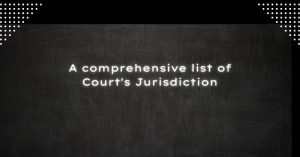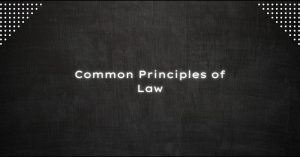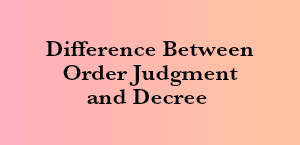Menu
The very act is punishable and no proof of damage is required.
At another place, elsewhere.
“No man shall be condemned unheard.” This principle ensures that all parties involved in a dispute have the right to be heard before judgment is passed.
A friend of the court or member of the Bar who is appointed to assist the Court with impartial legal expertise.
The meeting of minds, i.e., mutual assents, essential for the formation of a valid contract or agreement.
Incapable of crime, particularly used in reference to minors under a certain age.
The tort of wrongfully holding goods that belong to someone else, leading to legal action for recovery.
A gift because of death, often referring to a gift made in contemplation of one’s own death.
A legal principle that prevents a person from asserting something contrary to what is implied by a previous action or statement.
Proceedings conducted in the absence of the other party, typically referring to applications or motions where only one side is represented.
As a favor or goodwill gesture, not based on legal obligation but out of kindness or courtesy.
By virtue of holding a particular office, often used to describe roles or decisions made because of an official position.
Beyond human foresight, referring to events or outcomes determined by fate or destiny.
Justice is to be denied to nobody, emphasizing the fundamental right to fair treatment under the law.
The law must not be violated even by the king, asserting the supremacy of legal principles over arbitrary authority.
The right of a party to an action to appear and be heard by the court, based on their interest or connection to the case.
Acting in bad faith, with dishonest or deceitful intentions.
“We command.” A writ issued by a higher court to compel a government agency or public authority to perform a legal duty.
Guilty mind, referring to criminal intent or knowledge of wrongdoing.
An incorrect or inaccurate name or term used to describe something or someone.
Method or way of working, particularly used in describing the habitual way someone conducts themselves, especially in criminal activities.
Way of living or lifestyle, often used in legal contexts to describe agreements or arrangements between parties to coexist peacefully.
Nobody can be twice punished for the same offense, reflecting the principle of double jeopardy.
“No one should be a judge in his own case,” emphasizing the requirement for impartiality and fairness in legal proceedings.
A formal notice of abandonment by a plaintiff or prosecutor of all or part of a legal action, typically used to dismiss charges.
The substitution of a new contract or agreement in place of an existing one, with the consent of all parties involved.
“By what authority.” A legal action requiring a person to demonstrate the authority by which they hold a public office or position.
The principle or reason underlying a court’s decision, forming the basis for future legal judgments and precedents.
“The thing speaks for itself,” used in cases where the facts and circumstances surrounding an incident imply negligence or liability.
“The king can do no wrong,” historically asserting the immunity of the sovereign from legal liability.
“The welfare of the people is the supreme law,” highlighting the prioritization of public interest in legal and governmental matters.
The existing state of affairs or condition, particularly referring to the current situation or circumstances.
“Without a day.” Indefinitely postponed or adjourned, often referring to legal proceedings or meetings.
“Without which nothing.” An essential condition or requirement that is indispensable for something else to occur or be valid.
“Where there is a right, there is a remedy.” Ensuring that legal rights are accompanied by appropriate legal remedies or actions.
“Act of God.” Referring to extraordinary events or circumstances beyond human control, often used in contract law to excuse non-performance.
“To one who is willing, no wrong is done.” Damage suffered with consent or voluntary assumption of risk does not give rise to a legal claim.
A constitutional right or power to reject a decision or proposal, particularly used by executives to block legislation.
“In reverse order.” Referring to a situation where the order or positions of two elements are switched or reversed.
The voluntary relinquishment or surrender of a legal right or privilege, often done explicitly or by conduct.









